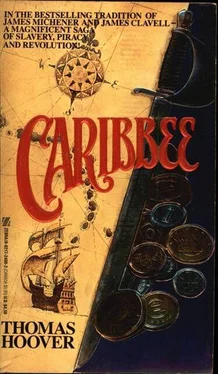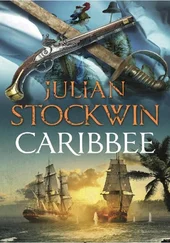Thomas Hoover - Caribbee
Здесь есть возможность читать онлайн «Thomas Hoover - Caribbee» весь текст электронной книги совершенно бесплатно (целиком полную версию без сокращений). В некоторых случаях можно слушать аудио, скачать через торрент в формате fb2 и присутствует краткое содержание. Жанр: Исторические приключения, на английском языке. Описание произведения, (предисловие) а так же отзывы посетителей доступны на портале библиотеки ЛибКат.
- Название:Caribbee
- Автор:
- Жанр:
- Год:неизвестен
- ISBN:нет данных
- Рейтинг книги:3 / 5. Голосов: 1
-
Избранное:Добавить в избранное
- Отзывы:
-
Ваша оценка:
- 60
- 1
- 2
- 3
- 4
- 5
Caribbee: краткое содержание, описание и аннотация
Предлагаем к чтению аннотацию, описание, краткое содержание или предисловие (зависит от того, что написал сам автор книги «Caribbee»). Если вы не нашли необходимую информацию о книге — напишите в комментариях, мы постараемся отыскать её.
Caribbee — читать онлайн бесплатно полную книгу (весь текст) целиком
Ниже представлен текст книги, разбитый по страницам. Система сохранения места последней прочитанной страницы, позволяет с удобством читать онлайн бесплатно книгу «Caribbee», без необходимости каждый раз заново искать на чём Вы остановились. Поставьте закладку, и сможете в любой момент перейти на страницу, на которой закончили чтение.
Интервал:
Закладка:
Like all the American settlements, Barbados' economy existed on barter and paper; everything was valued in weights of tobacco or cotton. Metal money was almost never seen; in fact, it was actually against the law to export coin from England to the Americas. The whole Council together couldn't come up with that much silver. He could forget about settling his sight bills in specie.
"I tell you this is the very thing every man here'll need if he's to sleep nights." Briggs voice cut through her thoughts. He was at the head of the table, describing the security features of his new stone house. "Mind you, it's not yet finished." He gestured toward the large square staircase leading up toward the unpainted upper floors. "But it's already secure as the Tower of London."
She remembered Briggs had laid the first stone of his grand new plantation house in the weeks after his return from Brazil, in anticipation of the fortune he expected to make from sugar, and he had immediately christened it "Briggs Hall." The house and its surrounding stone wall were actually a small fortress. The dining room where they sat now was situated to one side of the wide entry foyer, across from the parlor and next to the smoky kitchen, a long stone room set off to the side. There were several small windows along the front and back of the house, but these could all be sealed tight with heavy shutters-a measure as much for health as safety, since the planters believed the cool night breeze could induce dangerous chills and "hot paroxysms."
Maybe he thought he needed such a house. Maybe, she told herself, he did. He already had twenty indentures, and he'd just bought thirty Africans. The island now expected more slave cargos almost weekly.
As she listened, she found herself watching Hugh Winston, wondering what the Council's favorite smuggler thought of it all. Well, at the moment he looked unhappy. He seemed to find Briggs' lecture on the new need for security either pathetic or amusing-his eyes were hard to make out-but she could tell from his glances round the table he found something ironic about the need for a stone fort in the middle of a Caribbean island.
Briggs suddenly interrupted his monologue and turned to signal his servants to begin placing trenchers of clay pipes and Virginia tobacco down the table. A murmur of approval went up when the planters saw it was imported, not the musty weed raised on Barbados.
The appearance of the tobacco signaled the official end of the food. As the gray-shirted servants began packing and firing the long-stemmed pipes, then kneeling to offer them to the tipsy planters, several of the more robust wives present rose with a grateful sigh. Holding their new gowns away from the ant-repellent tar smeared along the legs of the table and chairs, they began retiring one by one to the changing room next to the kitchen, where Briggs' Irish maidservants could help loosen their tight bodices in preparation for the ball.
Katherine watched the women file past, then cringed as she caught the first sound of tuning fiddles from the large room opposite the entryway. What was the rest of the evening going to be like? Surely the banquet alone was enough to prove Briggs was now the most powerful man in Barbados, soon perhaps in all the Americas. He had truly outdone himself. Even the servants were saying it was the grandest night the island had ever seen-and predicting it was only the first of many to come.
The indentures themselves had all dined earlier on their usual fare of loblolly cornmeal mush, sweet potatoes, and hyacinth beans-though tonight they were each given a small allowance of pickled turtle in honor of the banquet. But for the Council and their wives, Briggs had dressed an expensive imported beef as the centerpiece of the table. The rump had been boiled, and the brisket, along with the cheeks, roasted. The tongue and tripe had been minced and baked into pies, seasoned with sweet herbs, spices, and currants. The beef had been followed by a dish of Scots collops of pork; then a young kid goat dressed in its own blood and thyme, with a pudding in its belly; and next a sweet suckling pig in a sauce of brains, sage, and nutmeg mulled in Claret wine. After that had come a shoulder of mutton and a side of goat, both covered with a rasher of bacon, then finally baked rabbit and a loin of veal.
And as though that weren't enough to allow every planter there to gorge himself to insensibility, there were also deep bowls of potato pudding and dishes of baked plantains, prickly pear, and custard apples. At the end came the traditional cold meats, beginning with roast duck well larded, then Spanish bacon, pickled oysters, and fish roe. With it all was the usual kill-devil, as well as Canary wine, Sherry, and red sack from Madeira.
When the grease-stained table had been cleared and the pipes lighted, Briggs announced the after-dinner cordial. A wide bowl of French brandy appeared before him, and into it the servants cracked a dozen large hen eggs. Then a generous measure of sugar was poured in and the mixture vigorously stirred. Finally he called for a burning taper, took it himself, and touched the flame to the brandy. The fumes hovering over the dish billowed into a huge yellow blossom, and the table erupted with a cheer. After the flame had died away, the servants began ladling out the mixture and passing portions down the table.
Katherine sipped the sweet, harsh liquid and watched as two of the planters sitting nearby, their clay pipes billowing, rose unsteadily and hoisted their cups for a toast. The pair smelled strongly of sweat and liquor. They weren't members of the Council, but both would also be using the new sugar-works-for a percentage-after Briggs had finished with his own cane, since their plantations were near Briggs' and neither could afford the investment to build his own. One was Thomas Lockwood, a short, brooding Cornwall bachelor who now held a hundred acres immediately north of Briggs' land, and the other was William Marlott, a thin, nervous Suffolk merchant who had repaired to Barbados with his consumptive wife ten years before and had managed to accumulate eighty acres upland, all now planted in cane.
"To the future of sugar on Barbados," Lockwood began, his voice slurred from the kill-devil. Then Marlott joined in, "And a fine fortune to every man at this table."
A buzz of approval circled the room, and with a scrape of chairs all the other men pulled themselves to their feet and raised their cups.
Katherine was surprised to see Hugh Winston lean back in his chair, his own cup sitting untouched on the boards. He'd been drinking all evening, but now his eyes had acquired an absent gaze as he watched the hearty congratulations going around.
After the planters had drunk, Briggs turned to him with a querulous expression.
"Where's your thirst, Captain? Will you not drink to the beginnings of English prosperity in the Caribbees? Sure, it's been a long time coming."
"You'll be an even longer time paying the price." It was virtually the first time Winston had spoken all evening, and his voice was subdued. There was a pause, then he continued, his voice still quiet. "So far all sugar's brought you is slavery. And prisons for homes, when it was freedom that Englishmen came to the Americas for. Or so I've heard claimed."
"Now sir, every man's got a right to his own mind on a thing, I always say. But the Caribbees were settled for profit, first and foremost. Let's not lose sight of that." Briggs smiled indulgently and settled his cup onto the table. "For that matter, what's all this 'freedom' worth if you've not a farthing in your pocket? We've tried everything else, and it's got to be sugar. It's the real future of the Americas, depend on it. Which means we've got to work a batch of Africans, plain as that, and pay mind they don't get out of hand. We've tried it long enough to know these white indentures can't, or won't, endure the labor to make sugar. Try finding me a white man who'll cut cane all day in the fields. That's why every spoon of that sweet powder an English gentlewoman stirs into her china cup already comes from a black hand in chains. It's always been, it'll always be. For sure it'll be the Papist Spaniards and Portugals still holding the chains if not us."
Читать дальшеИнтервал:
Закладка:
Похожие книги на «Caribbee»
Представляем Вашему вниманию похожие книги на «Caribbee» списком для выбора. Мы отобрали схожую по названию и смыслу литературу в надежде предоставить читателям больше вариантов отыскать новые, интересные, ещё непрочитанные произведения.
Обсуждение, отзывы о книге «Caribbee» и просто собственные мнения читателей. Оставьте ваши комментарии, напишите, что Вы думаете о произведении, его смысле или главных героях. Укажите что конкретно понравилось, а что нет, и почему Вы так считаете.












